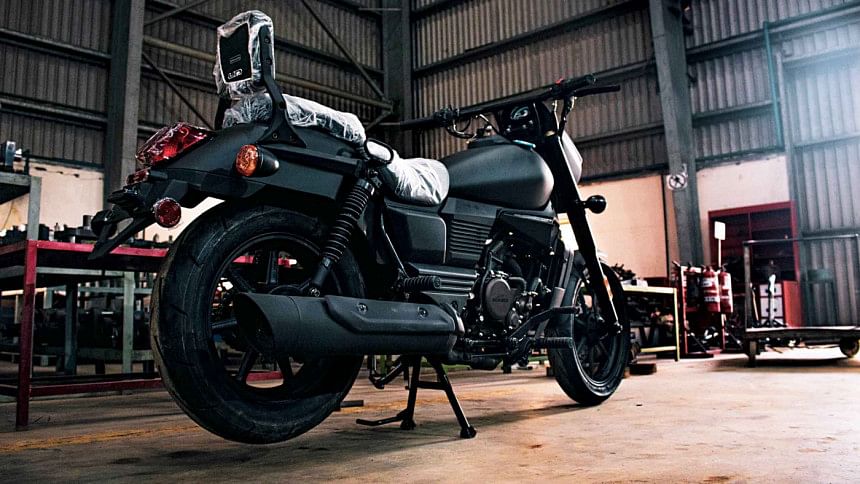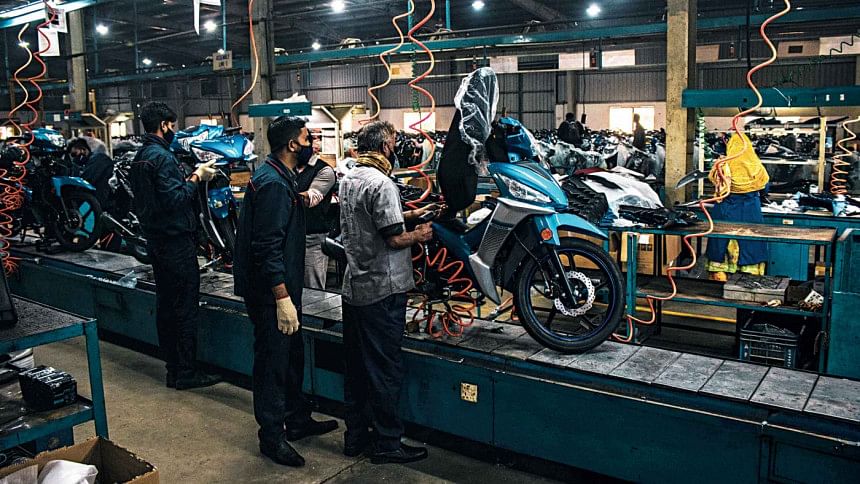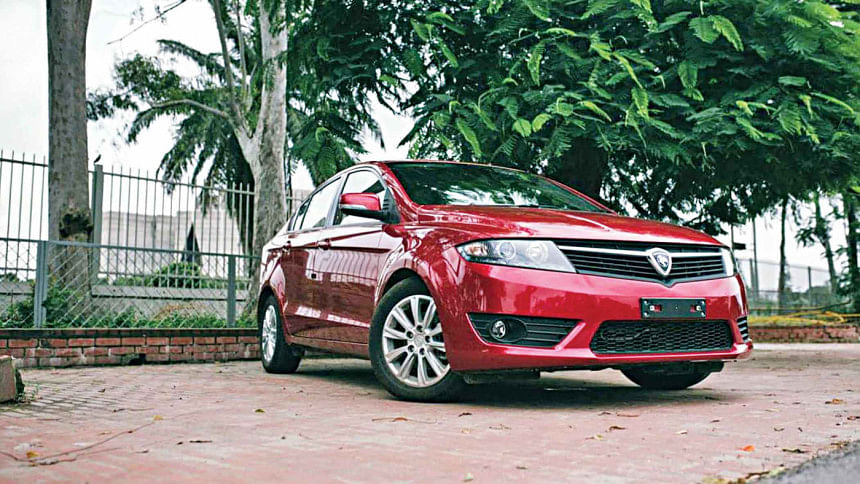A brief look at the auto industry in Bangladesh

The rapid growth of our economy and people's purchasing power has seen a rise in demand for personal transport. People are buying more cars and motorcycles than ever before, being able to pay their way through the duty inflated prices. To support this higher demand, more and more transport manufacturers have set up or setting up plants for local production. We have analysed both industries to see their current state and what the future holds for them.
Starting with four wheels, the car market in Bangladesh is small compared to many of our neighboring countries. Bangladesh's automobile density -- the number of vehicles per unit length of the roadway -- is as low as 0.5 percent, compared to the global average of 12 percent. Data from Bangladesh Road Transport Authority (BRTA) shows that there are a total of 4,471,625 registered vehicles in the country, of which only 370,519 are registered as 'Private Passenger Car' followed by 105,896 'Microbus' and 66,219 'Jeeps'.
On the other hand, the number of registered motorised vehicles has observed a fourfold increase in just 15 years, as it was only 303,215 units in 2003. People have been buying more cars than ever before, which presents a large opportunity for the local auto industry.
According to a report in this newspaper, the country has 12 million people in the medium-income generating affluent bracket and this segment of the population is growing very fast -- by 10 percent a year. Many of these consumers are not getting their desired vehicles because of high import duties, ranging from 130 per cent to 850 per cent.
To circumvent this issue, many companies are setting up or have set up local facilities.
Fair Technology Limited, the sole distributor of Hyundai cars in Bangladesh, is the most recent car company to make moves toward local production. The company signed a contract with Bangladesh Hi-Tech Park Authority (BHTPA) to establish an assembly plant on six acres of land. The company plans to invest $125 million in the next three to five years to set up a plant capable of churning out 5,000 vehicles a year. The company plans to begin production as soon as 2022 and claims the locally assembled cars are likely to be 25 percent lower than prevailing market rates.
PHP Motors, a sister concern of the PHP Family based in Chattogram, already manufactures cars made by Malaysia's Proton. Proton Preve, a decently equipped family sedan, has been locally put together for almost half a decade. The company also began assembling the 2021 Proton Saga, according to PHP Automobile chairman Sufi Mohammed Mizanur Rahman.

In terms of full production, the state-run Pragati Industries is working closely with Japanese automotive giant Mitsubishi Corporation to make Bangladesh's own brand of motor vehicles. Industries Minister Nurul Majid Mahmud Humayun said in 2020 that Japanese Ambassador Ito Naoki had told him "(They) are interested in increasing investments in Bangladesh". Currently, Pragati assembles cars designed by Mitsubishi Motors.
Moving from internal combustion engines to battery electric vehicles, BEV, the local automobile company Bangladesh Auto Industries Ltd. (BAIL), is building a BEV plant on Bangabandhu Industrial Park. The company planned to invest $200 million with total investment for the project reaching $1 billion within the next five years. They planned to "manufacture two-wheelers, three-wheelers, sedan, hatchback, and sport utility vehicle, SUV, and had plans to produce pick-ups, mini-trucks, and multipurpose vehicles," a report in 2019 claimed. Unfortunately, the pandemic slowed down BAIL's plans considerably, with all plans being moved back a year. "We missed the target as the suppliers could not ship the required equipment on time even though we opened letters of credit earlier on," Mir Masud Kabir, managing director of BAIL, told The Daily Star.
"We were on track before the Covid-19 crisis hit but the prevailing situation has not been favorable for us. Regardless, we are maintaining correspondence with our foreign partners via digital platforms to keep the project alive," he added.
The introduction of BAIL's BEVs will provide a major boost to the local auto scenario, especially if the company manages to meet its ambitious price point. BAIL went on public saying their SUV will sell at around Tk 25 lakh while sedans will be priced between Tk 12 lakh to Tk 15 lakh. Hatchbacks will go for Tk 8 lakh or less. Meanwhile, the price of motorcycles will range from Tk 50,000 to Tk 1.5 lakh. Whether the company will be able to fulfill this claim, remains to be seen.

Another local BEV venture that has been stalled by the lockdown is Nitol Motor's Suvare electric cars. The locally designed 25-Kwh battery-electric car will have the size and feel of regular sedans and will cost about Tk 10 lakh to Tk 12 lakh, according to Abdul Matlub Ahmad, chairman of Nitol-Niloy Group.
The company has already finished the construction of the assembly plant building on 10 acres of land in Pabna. The plant, currently awaiting installation of machinery, will be able to annually produce 20,000 EVs. The total set-up of the plant is estimated to be Tk 350 crore.
Asked about the delay, Matlub Ahmad said, "As per new target, we will bring the EV within next two and a half years."
When it comes to two-wheelers, there have been much more extensive developments.
The number of motorcycle users in Bangladesh has grown rapidly in the past few years. According to BRTA. the number of registered motorcycles increased about four times in the last decade, from 759,257 in 2010 to 2,991,612 in 2020. A report from the Daily Star in June last year showed around 5 lakh motorcycles were sold in FY 2018-19, up 25 per cent from 4 lakh a year ago. It means nearly 1,500 motorcycles are being purchased every day.
Subrata Ranjan Das, executive director of ACI Motors, reported in an interview in 2019 that the highest growth took place in the 150cc segment, followed by 110cc ones. Among the general growth, there also has been a sharp increase in the consumer demand for premium motorcycles. In an industry analysis conducted by Safat Ishtiaq, Head of Operations, Asian Motorbikes Limited, it was observed a strong demand for "Complete Built-Up" (CBU) motorcycles, such as their Ninja 125 along with Honda CBR and Yamaha R15v2. Around 300 of such high-priced motorcycles are sold every year, the analysis claims.
To support this rapid demand, the local motorcycle industry has snowballed, which has received 8,000 cr investment so far. Currently, the sector employs around 200,000 people in direct and indirect jobs and pays Tk 2,000 cr in duties every year.
In another report published in the Daily Star in July 2019, around 80 percent of motorcycles running in the country have either been locally manufactured or assembled. Bangladesh Honda (Private) Ltd has recently celebrated their 200,000 unit's cumulative production milestone. On the other hand, local motorcycle company Runner reported the production of 1,000 motorcycles a day in 2019. The company also debuted in exporting two-wheelers in 2017 to Nepal and Bhutan and shipped more than 700 units of bikes in 2019, followed by another 300 in 2020.

However, with these massive growths, there have been some setbacks. The displacement limit enforced by the government, which limits motorcycle engine capacity to 165cc, has caused trouble both for local export and growth of foreign industry investments. In terms of local growth, Amid Sakif Khan, Director at Runner Group of Companies, informed Daily Star the company ran into a problem trying to ensure the Q&C of these high displacement motorcycles. Because of the local cc restriction, Runner was unable to road test any of the bikes before sending them aboard. As a result, the numerous production flaws plagued those models, hurting both Runner's reputation and sales.
When it comes to foreign investments, Kawasaki approached Bangladesh's Ministry of Commerce in December 2019 about setting up a local production facility. However, to make the venture profitable, they requested the displacement limit be raised to at least 250, as the company primarily specializes in making premium motorcycles of 250cc and up. The proposal fell on deaf ears and joined the list of lost opportunities for the local motorcycle industry.
As it is, the displacement cap remains a major thorn in the side of the local motorcycle industry, but with recent talks of raising the limit, many have been hopeful. Doing so will greatly increase the opportunity for foreign investments and will open the market to bigger opportunities.

 For all latest news, follow The Daily Star's Google News channel.
For all latest news, follow The Daily Star's Google News channel. 



Comments